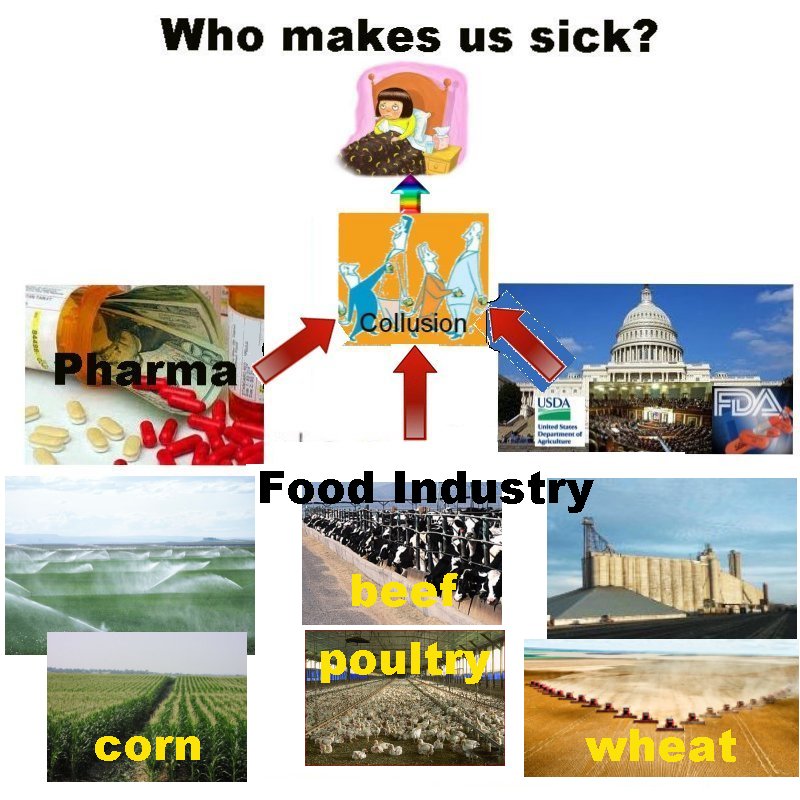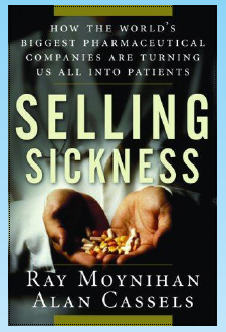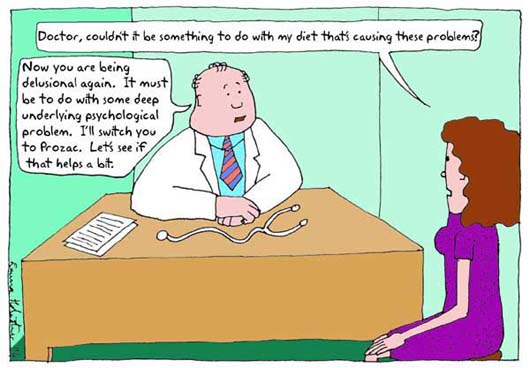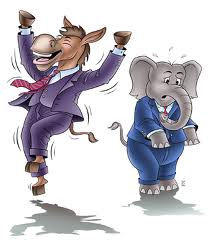Summarized by Walter
How the World’s Biggest Pharmaceutical Companies Are Turning Us All into Patients.
Updated September 25, 2010. Disclaimer The information presented here is for informative and educational purposes only and is not intended as curative or prescriptive advice.
| "It is simply no longer possible to believe much of the clinical research that is published, or to rely on the judgment of trusted physicians or authoritative medical guidelines. I take no pleasure in this conclusion, which I reached slowly and reluctantly over my two decades as an editor of The New England Journal of Medicine." Marcia Angell MD: corruption |
The title tells the real message of this article. Drug companies are in the business of making us sick instead of healthy. Orchard: sickness business | Kapp: sick business | Wiki: Marketing drugs | Ryan: drugs injure - kill | Sharav: conflicts of interest The drug industry is transforming the way we think about physical and mental health and turning more and more of us each year into sick customers. "Drug companies have mastered the art of concocting the disorder, creating the drug for the disorder and then bombarding the public with advertisements to convince them they’re afflicted, leaving little choice but to get “prescribed." Waduge: Med corruption The marketing strategies of the largest drug companies now target the healthy and the well. Tell the "supposed" healthy that they are sick and give them a pill!
Unholy alliance between the pharmaceutical industry, researchers, and doctors: "Now primarily a marketing machine to sell drugs of dubious benefit, this industry uses its wealth and power to co-opt every institution that might stand in its way, including the U.S. Congress, the Food and Drug Administration, academic medical centers, and the medical profession itself." Brownlee: Bitter Medicine
Drug companies are not alone in making healthy people sick. The Department of Agriculture [ DA ] does not subsidize healthy foods. For example, the DA has endorsed the use of corn syrup as an inexpensive sweetener that has been added to many processed foods. Corn syrup has been controversially linked to numerous health problems, including overeating and obesity. The Department of Agriculture has also been implicated in their farm subsidies programs in endorsing consumption of farm animal foods that are linked to cancer, cardiovascular diseases and other chronic diseases.
In the middle of all the profit liaisons is the FDA: Kleine: FDA review | Meridith:Truth about drug companies
|
FDA funding fees: "Regulators don't negotiate their budgets with industries they oversea, with the exception of the FDA. In the early 1990s, the pharmaceutical industry began paying the FDA millions of dollars in user fees in order to speed up the drug approval process. These fees "now fund more than half the agency's critical drug-review process." Industry groups and the FDA renegotiate the fees and how they're used every five years, giving drug makers "considerable input into which programs receive funding." In 2006 the FDA negotiated an agreement with the Pharmaceutical Research and Manufacturers of America and Biotechnology Industry Organization." April 7, 2010 CMD Source Watch: FDA on the take |
 with many of their expert members
having a revolving door to various food and drug companies and their tainted
manner of approving consumer products.
Adams: FDA suppresses drug info
with many of their expert members
having a revolving door to various food and drug companies and their tainted
manner of approving consumer products.
Adams: FDA suppresses drug info
Then there are the politicians who pass laws dealing with our food supply:
|
|
Robyn O'Brien writes in her book, The Unhealthy Truth: How Our Food Is Making Us Sick and What We Can Do About It. She points out the recent deregulation of the American food system that allowed chemicals and additives into the American food supply in order to enhance profitability for the food industry - chemicals that have either been banned or labeled from foods around the world. O'Brien: book quotes
Collectively, the drug companies, the food and drink industry, the FDA, Dept. of Agriculture and our own government stick together to make a sick society.

"Collusion is an agreement, sometimes illegal and therefore secretive, which occurs between two or more persons to limit open competition by deceiving, misleading, or defrauding others of their legal rights, or to obtain an objective forbidden by law typically by defrauding or gaining an unfair advantage. It is an agreement among firms to divide the market, set prices, or limit production. It can involve "wage fixing, kickbacks, or misrepresenting the independence of the relationship between the colluding parties." In legal terms, all acts effected by collusion are considered void." Wiki: Collusion
 Drug companies create illness in a very sophisticated and subtle manner. Hall: drug silence
| Ryan: drugs injure - kill
|
Sharav: conflicts of interest
And yes, what
they do is legal!
Ray Moynihan and Alan Cassels, in their book, Selling Sickness, have summarized
how the pharmaceutical industry connives a bad or antisocial behavior into a medical illness, then labels people as
being sick, creates a market by making people appear to be sick and then sells drugs to them. There
is a plethora of researchers and health experts who agree with the two authors. Angell: Drugs doctors corruption
|
Conrad: Deviance and Medicalization |
Calfee: Past medicine complaints
|
Peterson: Drug health disaster |
Brennan: MD-industry conficts |
Kapp: sick business |
Chetley: Pill pushers
|
Fraudulent Medical Research
Drug companies create illness in a very sophisticated and subtle manner. Hall: drug silence
| Ryan: drugs injure - kill
|
Sharav: conflicts of interest
And yes, what
they do is legal!
Ray Moynihan and Alan Cassels, in their book, Selling Sickness, have summarized
how the pharmaceutical industry connives a bad or antisocial behavior into a medical illness, then labels people as
being sick, creates a market by making people appear to be sick and then sells drugs to them. There
is a plethora of researchers and health experts who agree with the two authors. Angell: Drugs doctors corruption
|
Conrad: Deviance and Medicalization |
Calfee: Past medicine complaints
|
Peterson: Drug health disaster |
Brennan: MD-industry conficts |
Kapp: sick business |
Chetley: Pill pushers
|
Fraudulent Medical Research
Not only do the drug lords create drugs for profit, they also create a market for their drugs. They have the money to control politicians in Washington and pay the mass media to shape the minds of people and doctors. The marketing strategies of the world’s biggest drug companies target the healthy and the well.
The medicalization system has become organized and deliberate in the past 20 years: Conrad: Deviance and Medicalization | Waduge: Med corruption Pharmaceutical corporations create a drug first, then find a market for it, then sanctify the disease or disorder with a medical name, then legislate for it and finally get legal FDA Adams: FDA suppresses drug info approval for the newly created drug. The new medication is often designed as a prescription therapy for a hypothetical illness that very often does not exist! All this process, from beginning to the end, is conceived and controlled by the drug industry. It is power and money manipulating the well-being into a sick society.
A video of the same title below, Selling Sickness, was researched by Catherine Scott and Ray Moynihan, and focuses on the ways in which pharmaceutical companies create a market to sell drugs legally. The common sense you thought was common sense is in fact a result of effective marketing campaigns which earn the pharmaceutical companies big money.
You can read the book or/and view the video. Below are videos summarizing how people are made sick and sold medications.
Mild problems and behaviors are being diagnosed as serious diseases. Drug companies practice medicalization by: Orchard: sickness business
- redefining a disease, disorder or behavior; create a medical problem where there was none!
- dominating clinical research: Almost all the clinical trials of the new antidepressants were funded by their manufacturers rather than public or not-for-profit sources.
- providing medical education of doctors: Medical knowledge accelerates too rapidly for doctors to catch up. So drug company representatives not only pay to educate doctors regarding the particular drugs their company produces but increase the doctor’s knowledge of the expanded base of diseases that can be treated by their drugs.
Instead of relying on evidence for the presence of a disease, and evidence of a favorable risk/benefit ratio to justify a medical intervention, doctors are prescribing drugs based on corporate sponsored "public awareness" campaigns that create "illness." Moynihan: Making us patients
REAL medical prescription: "What is ironic is that there is not a single chronic disease which has been cured as a result of taking prescription drugs. The world is becoming sicker, fatter and more depressed than ever. The advice that people should listen to is not being given .... eat healthy, avoid processed foods, avoid refined carbohydrates, avoid soft drinks, etc., are rarely highlighted." Waduge: Med corruption
|
Fixing the PHARMA system and stop making us sick The skyrocket cost of making drugs is bankrupting all countries and especially the United States. We need to change the patent laws, stop drug lobbying, change the responsibilities of the FDA and the way it functions, stop politicians receiving funding for favors, trips and campaigns, outlaw pork barrel spending, update the medical school curriculae and change the way doctors practice medicine. Take the lust for power and money away from the food industries and drug corporations and restore the government back to the people. "There is a far better way to develop medicines, if only we will take it. It was first proposed by Joseph Stiglitz, the recent Nobel Prize winner for economics. He says: "Research needs money, but the current system results in limited funds being spent in the wrong way." "Stiglitz's plan is simple. The governments of the Western world should establish a multi-billion dollar prize fund that will give payments to scientists who develop cures or vaccines for diseases [ economic incentives ]. The highest prizes would go to cures for diseases that kill millions of people, like malaria. Once the pay-out is made, the rights to use the treatment will be in the public domain. Anybody, anywhere in the world, could manufacture the drug and use it to save lives." "Health care systems would no longer have to pay huge premiums to drug companies. We have to tear down this sick system – so the sick can live. Only then we can globalize the spirit of Jonas Salk, the great scientist who invented the polio vaccine, but refused to patent it, saying simply: "It would be like patenting the sun."" Hari: drug profits truth |
Sales Tactics:
|
Here are five drug industry tactics that serve to put their bottom lines above the country’s welfare: 1. Direct Advertising to ConsumersFor more details: Smiljanich: Profits before patients |
![]()
This 'sick society' topic is a complex issue and and I have touched the surface of the iceberg, so to speak. It is a shocking revelation. We have a broken health care system that is a major part of the problem. Fraudulent Medical Research
It has been said, "Doctors fear drug companies like bookies fear the mob."
Sharav: conflicts of interest
Eleanor Roosevelt said that “Great minds discuss ideas; average minds discuss events; small minds discuss people.”
A bold adventure:
 I think that you and I, dear reader, are capable of discussing ideas beyond just
where the price of gold is headed, what Operah is wearing today, the workings of government, or the latest political shenanigans.
Having a different point of view is healthy. For it is the new ideas that
stimulate us to reassess our points of view and find solutions.
But hopefully this article provided a spark to ignite your curiosity to find out
more about the possibilities of who really creates a sick or healthy society. In the end we
all need to make sense out of this "mess!"
I think that you and I, dear reader, are capable of discussing ideas beyond just
where the price of gold is headed, what Operah is wearing today, the workings of government, or the latest political shenanigans.
Having a different point of view is healthy. For it is the new ideas that
stimulate us to reassess our points of view and find solutions.
But hopefully this article provided a spark to ignite your curiosity to find out
more about the possibilities of who really creates a sick or healthy society. In the end we
all need to make sense out of this "mess!"
The references provide more good detailed reading about the issues of PHARMA and how Americans are being manipulated into a sick society. The health industry has a conflict of interest that needs to be challenged. Sharav: conflicts of interest | Brennan: MD-industry conficts Meridith:Truth about drug companies An entire health - food -drug reform is long overdue. Calfee: Past medicine complaints
Need more convincing? Then listen to a successful 15 year drug rep, Gwen Olsen, who quit in disgust. Listen to her comments on the drug industry by clicking via u-tube or below:

"Its not until we are lost that we begin to understand ourselves!"
Your feedback on this article is most appreciated. Thank you: E-mail author
References:
Adams Mike, "FDA accused of suppressing drug safety information (commentary)," Natural News, October 14, 2005. Adams: FDA suppresses drug info
Angell Marcia, "Call it corruption," Health Care for All, December 29, 2008. Angell: corruption
Angell Marcia, "Drug Companies & Doctors: A Story of Corruption," Random House Publications, 2004; The New York Review of Books, January 15, 2009. Angell: Drugs doctors corruption Dr. Angell is a former editor of the New England Journal of Medicine
Arnst Cathy, "U.S. Medical Prices Highest In the World," Money and Politics: Bloomberg Businessweek, November 02, 2010. Arnst: Med prices 2010
Barrett Jennifer, "Selling Sickness: Newsweek Interview with Ray Moynihan," Newsweek Incorporated, August 2, 2005. Barrett: interview selling sickness A new book looks at how pharmaceutical companies are using aggressive marketing campaigns to turn more people into patients.
Brennan, Troyen et la., "Health industry practices that create conflicts of interest," JAMA, 2006:295:429-433. Brennan: MD-industry conficts
Brownlee Shannon, "Bitter medicine," Mother Jones, September/October, 2004. Brownlee: Bitter Medicine
Calfee John E., "Medicine's Miracle Man," The Journal of the American Enterprise Institute, From the Magazine: January 23, 2009. Superb article about PHARMA misconduct Calfee: Past medicine complaints
"The pharmaceutical industry has been under attack for longer than most people realize. In the 1950s and 1960s, when for the first time in history we had quite a few drugs that worked very well—including many antibiotics,"
A flood of books, including some by authors with academic credentials, have re-circulated many of the same arguments (albeit with more emphasis on safety). The more scholarly works include Merrill Goozner’s The $800 Million Pill: The Truth Behind the Cost of New Drugs; Jerome Kassirer’s On The Take: How Medicine’s Complicity with Big Business Can Endanger Your Health; and Jerry Avorn’s Powerful Medicines: The Benefits, Risks, and Costs of Prescription Drugs. Others have a more muckrakian tone, beginning with the much quoted The Truth About the Drug Companies by former New England Journal of Medicine editor Marcia Angell, and continuing on to many others including Ray Moynihan and Alan Cassels’s Selling Sickness: How the World’s Biggest Pharmaceutical Companies Are Turning Us All Into Patients; Howard Brody’s Hooked: Ethics, the Medical Professions, and the Pharmaceutical Industry; Alison Bass’s Side-effects: A Prosecutor, a Whistleblower, and a Bestselling Antidepressant on Trial (about the drug Paxil); and Philip R. Lee’s Pills, Profits, and Politics.
Campaign Against Fraudulent Medical Research Fraudulent Medical Research
Cassel, Selling sickness book, Prologue and first two chapters: Cassel: selling sickness
Chetley Andrew, "Pill Pushers, Drug Dealers," New Internationalist Issue, 272, 1995. Chetley: Pill pushers
CMD, Center for Media and Democracy, "Pharmaceutical Industry, Source Watch, April 7, 2010 CMD Source Watch: senators on the take
Collusion defined by Wikipedia. Wiki: Collusion
Collusion is an agreement, sometimes illegal and therefore secretive, which occurs between two or more persons to limit open competition by deceiving, misleading, or defrauding others of their legal rights, or to obtain an objective forbidden by law typically by defrauding or gaining an unfair advantage[citation needed]. It is an agreement among firms to divide the market, set prices, or limit production. It can involve "wage fixing, kickbacks, or misrepresenting the independence of the relationship between the colluding parties." In legal terms, all acts effected by collusion are considered void.
Conrad Peter and Joseph W. Schneider, Deviance and Medicalization: From Badness to Sickness. Temple University Press, 1992. Conrad: Deviance and Medicalization
"A slow but active transformation of deviance has taken place in American society. It has not been a change in behavior as such, but in how behavior is defined. ... These changes have been the result of specific people, events, ideas and techniques. ... This change is surely profoundly political in nature. This book presents an analysis of the historical transformation of definitions of deviance from "badness" to "sickness." It focuses on the medicalization of deviance in American society."
Fanu James Lee, The Rise and Fall of Modern medicine, Caroll and Graff Publishers, New York, 2000. Fanu: Rise-fall medicine
The decades from the 1940s to the 1980s saw some of the most critically important advances Western medicine has seen, from penicillin to the heart pump that made open-heart surgery possible. Yet doctors are disillusioned, patients are turning in droves to alternative forms of medicine. ... During the century before 1940, people grew healthier and lived longer through improved hygiene, housing, and nutrition. Once they got sick, however, doctors weren't that much help: except for a few treatments (such as thyroid hormone, insulin, and vitamins) a patient got better pretty much on his own--or he didn't.
Goldberg Robert and Peter Pitts, "Prescription for Progress: The Critical Path To Drug Development," A Working Paper of the 21st century FDA Task Force, Manhattan Institute for Policy Research, June, 2006. Goldberg: FDA ideas
Center for Medical Progress at the Manhattan Institute convened 25 experts from industry, government, and the scientific community in a task force on the 21st century FDA. ... How advances in genomics and other disciplines might be used to optimize the drug approval process.
Hall Mike, "What drug companies aren't telling you," AFL-CIO, Hall: drug silence
Hari Johann, "The hidden truth behind drug company profits," The Independent, August 5, 2009. Hari: drug profits truth
The argument in defence of current drug cost system offered by Big Pharma is simple, we need to charge large sums for "our" drugs so we can develop more life-saving medicines.
But a detailed study by Dr Marcia Angell, the former editor of the prestigious New England Journal of Medicine, says that only 14 per cent of their budgets go on developing drugs.
Patent dysfunction: Drug companies squander a fortune developing "me-too" drugs – medicines that do exactly the same job as a drug that already exists, but has one molecule different, so they can take out a new patent, and receive another avalanche of profits.
As a result, the US Government Accountability Office says that far from being a font of innovation, the drug market has become "stagnant". They spend virtually nothing on the diseases that kill the most human beings, like malaria , because the victims are poor, so there's hardly any profit to be sucked out.
The drug companies have spent more than $3bn on lobbyists and political "contributions" over the past decade in the US alone. They have paid politicians to make the system work in their interests. If you doubt how deeply this influence goes, listen to a Republican congressman, Walter Burton, who admitted of the last big health care legislation passed in the US in 2003: "The pharmaceutical lobbyists wrote the bill."
Hearn Kelly, "We're All Patients Now," Alter Net, September 14, 2005. Hearn: Backlash against PHARMA
"Last month, the state of California sued 39 drug companies for price gouging. A week earlier, a jury hit Merck & Co. with a $253 million verdict over its painkiller Vioxx, which was linked to patient deaths."
India PHARMA data book: Abridged Version), Compiled and published by GHARPURE ASSOCIATES, Mumbai, India, 2003. Pharma Data India 2003
Kapp Matt, "Vanity Fair - The Sick Business of Health-Care Profiteering," WEB EXCLUSIVE September 24, 2009 . Kapp: sick business
Kleine Daniel B. and Alexander Tabarrok, "Is the FDA safe and effective?" FDA Reviewing: The Independent Institute Kleine: FDA review
Kushner Howard I., "Evidence-Based Medicine and the Physician-Patient Dyad," The Permanente Journal, Spring 2010/Vol. 14, No. 1. Kushner: Controversy in medicine
Meredith Peter, The truth about drug companies," Mother Jones, [ Interview with Marcia Angell ], September 07, 2004. Meridith:Truth about drug companies
"The author [ Marcia Angell, MD ] calls the pharmaceutical industry a vast marketing machine? that thrives on monopoly rights and public-sponsored research but produces few innovative drugs."
"[Pharmaceutical companies] have too much influence over the education of physicians in this country. They have too much control over the evaluation of their own products, and that’s a conflict of interest."
Montgomery Cal: July 28, 2005 Montgomery: viewpoints about PHARMA
Moynihan Ray and Alan Cassels, "Prologue Selling sickness," Moynihan: prologue
Moynihan Ray & Alan Cassels, "Selling Sickness," Book: Selling Sickness, 2005
O'Brien Robyn, "The Unhealthy Truth: How Our Food Is Making Us Sick," Random Books, New York, 2009. O'Brien: book qoutes O'Brien: food makes us sick O'Brien: book excerpt
As highlighted in The Unhealthy Truth: How Our Food Is Making Us Sick and What We Can Do About It, Robyn O'Brien diagnoses the recent deregulation of the American food system that allowed chemicals and additives into the American food supply in order to enhance profitability for the food industry - chemicals that have either been banned or labeled from foods around the world.
"I believe that we have a flawed federal policy when it comes to health care: under our commercial health care system, there is profitability in our illness."
"Discovering the corporate corruption, government cover-ups, and outright greed that have broken our system was enough to break my heart."
Ornish Dean, "Transforming Medicine: An Historic Event," The Huffington Post, Posted February 26, 2009. Ornish: Transforminf medicine
Orchard Brian, "The Sickness Business," Vision, Spring 2006 Issue. Orchard: sickness business
Peterson Melody, Our Daily Meds, McMillan Publishers, March, 2009. Peterson: Drug health disaster
"Prescription medicines can help you if you get the right drug at the right time. But over the last 25 years, a powerful force has made that less likely to happen. That force is aggressive promotion on the part of the pharmaceutical industry. The big drug companies have learned that if they spend enough promoting a drug – even one that often doesn’t work as advertised – they can earn billions of dollars."
Ryan Robert, " Why do pharmaceutical drugs injure and kill? Because they are fraudulently tested? Ryan: drugs injure - kill
Ruesch Hans, "The Truth About the Rockefeller Drug Empire: The Drug Story," Ruesch: drug story
Selling Sickness: Pharma Industry Turning Us All Into Patients, September 12, 2005. Moynihan: Making us patients
Sharav Vera Hassner, " Conflicts of Interest," 14th TRI-SERVICE CLINICAL INVESTIGATION SYMPOSIUM, Sponsored By THE U.S. ARMY MEDICAL DEPARTMENT And THE HENRY M. JACKSON FOUNDATION FOR THE ADVANCMENT OF MILITARY MEDICINE, May 5-7, 2002. Sharav: conflicts of interest
It has been said, "Doctors fear drug companies like bookies fear the mob."
In January 2002, the Association of American Medical Colleges (AAMC) approved a report by its task force stating: "Financial conflicts of interest of clinical investigators... [is] the single issue that [ ] poses the greatest threat to maintaining public trust in biomedical research." [1] The report did not address institutional conflicts of interest which create a culture that collides with the humanist tradition.
Physicians reading the current issue of JAMA[2] will be startled to learn that a team of Harvard University professors are advising physicians NOT to prescribe new drugs to their patients because their safety has not been established - despite FDA approval. Adverse drug reactions,[3] they acknowledge, is the leading cause of death in the U.S.
The JAMA report provides a basis for evaluating the value and relevance of clinical trial findings for clinical care. It also provides a basis for measuring FDA's performance as gatekeeper in preventing hazardous drugs from reaching the market. They found that clinical trials are underpowered to detect uncommon, but potentially lethal drug reactions. Their design, biased selection, short duration, and accelerated approval process almost ensures that severe risks go undetected during clinical trials.
Smiljanich Terry, "5 Ways Drug Companies Put Profits Before Patients," Consumer Warning Network, September 10, 2009. Smiljanich: Profits before patients
Here are five drug industry tactics that serve to put their bottom lines above the country’s welfare:
1. Direct Advertising to Consumers
2. Payments to Doctors
3. Self-financed drug studies
4. Politicians for Rent
5. Off-label marketing
Waduge Shenali, "Doctors, Drug Companies, Politicians & Corruptions," Asian Tribune, published by World Institute For Asian Studies|Powered by WIAS Vol. 10 No. 142, August 21, 2008. Waduge: Med corruption
"But, why is the pharmaceutical industry the most profitable industry in the world? It is because they have mastered the art of concocting the disorder, creating the drug for the disorder and then bombarding the public with advertisements to convince them they’re afflicted, leaving little choice but to get “prescribed”."
Wikipedia, "Pharmaceutical marketing," Wiki: Marketing drugs
"Pharmaceutical company spending on marketing far exceeds that spent on research.[2][3] In Canada, $1.7 billion was spent in 2004 to market drugs to physicians; in the United States, $21 billion was spent in 2002.[4] In 2005 money spent on pharmaceutical marketing in the US was estimated at $29.9 billion with one estimate as high as $57 billion.[3] When the US number are broken down 56% was free samples, 25% was detailing of physicians, 12.5% was direct to consumer advertising, 4% on hospital detailing, and 2% on journal ads.[4]"
 "According to a USA Today data analysis by the non-partisan groups Center for Responsive Politics (CRP) and Political Money Line,
49 senators who voted against drug importation received approximately five million dollars from industry executives and political
action committees since 2001. This amount comprises almost three quarters of all industry donations to current Senate members."
April 7, 2010
"According to a USA Today data analysis by the non-partisan groups Center for Responsive Politics (CRP) and Political Money Line,
49 senators who voted against drug importation received approximately five million dollars from industry executives and political
action committees since 2001. This amount comprises almost three quarters of all industry donations to current Senate members."
April 7, 2010